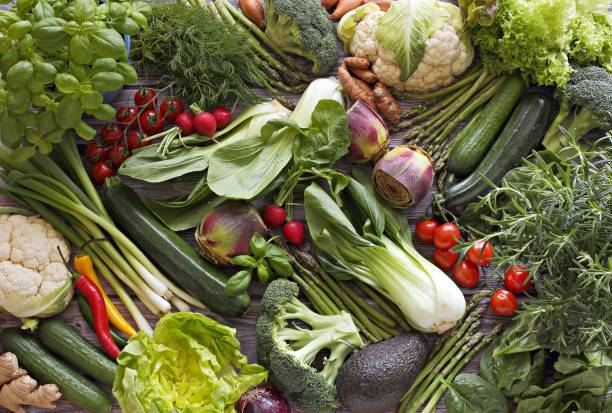It is no secret that meat consumption is negatively affecting our planet, thus the importance of vegetarian diets. Despite the popularity of meat worldwide, more and more people are shifting towards plant-based alternatives.
According to estimates, the world produces around 350 million tons of meat yearly. However, more people are now aware of how this mass consumption affects the environment, which is why it is under scrutiny.
Meat production leads to greenhouse gas emissions, deforestation, water pollution, waste pollution, and biodiversity loss. More individuals and organizations are embracing plant diets to mitigate these environmental impacts due to this.
These diets, which emphasize plant-based foods and reduce or eliminate animal products, have gained popularity due to their potential health and environmental benefits.
What is a Vegetarian Diet?

Any food that is derived entirely from plants is considered plant food. Therefore, a vegetarian diet is one in which the food source is from plant products.
Officially, a vegetarian diet does not prohibit its advocates from eating animal products; but it specifies that they consume them in small quantities.
A vegetarian diet might have different meanings and uses. According to some, it involves avoiding all animal products, which is a vegan diet. Others consume plant foods, including fruits, vegetables, whole grains, while occasionally eating meat, fish, and dairy products.
Nutritionists prescribe vegetarian diets to patients with chronic diseases such as heart conditions, high blood pressure, and high cholesterol as the healthiest diet option. People who eat a vegetarian diet may also lose weight.
Key Stats on Vegetarian Diets
The following statistics illustrate the growing global demand for vegetarian foods:
- Between 2004 and 2022, Google Trends shows a dramatic rise in interest in veganism worldwide. Some top regions include Israelis, Australians, Brits, Austrians, and Kiwis.
- According to a survey by OkCupid in early 2022, 90% of its users value caring about the planet, specifically climate change, when looking for a romantic partner.
- 10 million vegans lived in the United States between 2004 and 2019, according to a study by Ipsos Retail Performance.
- In the UK, the Vegan Society and Vegan Life magazine commissioned research showing that vegans have increased by 360% in the past decade.
- The number of vegetarians in Canada has increased by 250%. According to 2020 data, more than 2.3 million vegetarians and 850,000 vegans live in Canada.
- According to research by Nielsen, from 2007 to 2017, vegetarianism increased by 400% in Portugal.
- Asia is becoming more and more vegan. According to the Food-Based Dietary Guidelines of China, they consume large quantities of vegetables and soybeans.
- Australian food products with a vegan claim increased by 92% between 2014 and 2016. In terms of plant-based eating preferences, Australia ranks second only to the UK.
The Rise of Vegetarian Diets
As people become aware of the benefits of reducing their consumption of animal products, they are increasingly turning to plant-based diets.
Eco-friendly diets focus on whole, minimally processed foods derived from plants, such as fruits, vegetables, grains, legumes, nuts, and seeds.
People love them for a variety of reasons, such as:
- Fruit and vegetable diets can reduce the risk of chronic diseases like cancer and heart disease.
- A plant diet is also more sustainable and eco-friendly than a diet high in animal products, as it requires less water, land, and resources to produce.
- A meatless diet is also popular because of ethical concerns related to animal welfare. These ethical concerns lead people to reduce or eliminate their consumption of animal products.
- Vegetarian diets are positive trends that can benefit both individuals and the environment.
Plant-based nutrition must, however, be balanced nutritionally and include all the necessary nutrients for good health. It is possible to ensure an eco-friendly diet is healthy and sustainable by consulting a registered dietitian.
The Evolution of Vegetarian Diets
It appears that the world is shifting toward plant-based nutritional alternatives. You can also see that this trend will be here for a long time due to its perks.
The term “vegan” began to be replaced by “plant-based” around the middle of the 2010s, making this way of eating more inclusive and welcoming to a wider audience.
There are now plant-based alternatives to almost anything in mainstream grocery stores, from beef to eggs to dairy products.
Vegetarian food items have found their way to the menus of many restaurants. The taste of eco-friendly foods is better than ever – some are nearly identical to animal products.
This worldwide shift away from consuming animal products appears to be driven primarily by Millennials – who have normalized plant-based eating and are driving consumer demand.
Despite this, the plant-based movement transcends generations. Almost everyone is on board with eating more vegetarian diets, from celebrities to athletes to companies like Google and even countries like China.
There is still a long way to go before vegetarian eating becomes mainstream. However, the trend is gaining acceptance every day. The impact of this trend is far-reaching.
Types of Vegetarian Diets

In a diet that focuses on plant produce, the amount of animal products excluded varies.
- Vegan
Vegan diets exclude all animal products, including meat, fish, dairy, eggs, and honey. Vegan diets consist only of sustainable foods.
- Vegetarian
Vegetarian diets exclude meat, fish, and poultry; but may include dairy and eggs. Vegetarians may also exclude certain animal products found in some foods, such as gelatin and rennet.
- Flexitarian
The flexitarian diet is primarily plant-based but occasionally includes meat, fish, and poultry.
- Pescatarian
Pescatarian diets exclude meat and poultry but include fish and seafood.
- Mediterranean
Fruits, vegetables, whole grains, legumes, nuts, and olive oil are all part of a Mediterranean diet. They also include moderate amounts of fish, poultry, and dairy.
- Whole food plant-based (WFPB)
In the WFPB diet, plant-based whole foods are the focus, with no animal products or highly processed foods being allowed.
Vegetarian diets are healthy and can provide all the necessary nutrients, but they must be well-balanced and provide all the essential nutrients.
Consult with a registered dietitian to ensure nutritional adequacy and sustainability of an eco-friendly diet.
Successful Movements and Initiatives on Vegetarian Diets
Some several successful plant-based movements and initiatives have gained popularity in recent years:
- Meatless Monday: An international movement called Meatless Monday encourages people to go meatless for one day every week. The goal is to reduce meat consumption for health, the environment, and animal welfare reasons.
- Veganuary: It encourages people to follow a vegan diet for January. Many people have adopted a plant-based lifestyle thanks to its popularity.
- Plant-Based Treaty: Plant-Based Treaty promotes plant-based diets and reduces animal agriculture to ensure that people are healthier.
- EAT-Lancet Commission: A group of international experts, the EAT-Lancet Commission, has developed a plant-based diet plan that is healthy and sustainable.
- The Game Changers: A documentary called The Game Changers explains how plant-based diets can enhance athletic performance.
- Beyond Meat and Impossible Foods: In recent years, they have gained popularity as plant-based meat alternatives.
- They are available in many restaurants and grocery stores, making plant-based diets more mainstream and accessible.
Challenges and Limitations of Vegetarian Diets
Despite the many potential benefits of a plant-based diet, several challenges and limitations can make the transition difficult for some individuals and communities.
A few of the most common challenges and limitations are listed below:
1. Economic constraints
Vegetarian diets can be expensive, which presents one of the biggest challenges. Compared to processed and packaged foods, plant-based foods can be more expensive.
In addition, the lack of access to fresh and healthy foods makes adopting a vegetarian diet difficult for many low-income communities.
2. Social and cultural factors
Meat consumption is often a central part of cultural and social traditions, making it difficult for people to give it up.
Moreover, plant-based eaters find it hard to participate in social gatherings and events on meat-based meals.
3. Nutritional concerns
It is possible to eat a vegetarian diet that is nutritionally sufficient if you plan carefully. However, it may also be deficient in some nutrients, such as calcium, vitamin B12, and iron.
Children, pregnant and lactating women, and older adults may be particularly at risk.
4. Sustainability of vegetarian farming
There is a growing demand for plant-based foods, which demands sustainable farming practices that do not have the same environmental impacts as animal agriculture.
Agribusiness practices that involve large-scale monocultures can also degrade soils and decrease biodiversity.
Directions and Possibilities for the Future of Vegetarian Diets
There are several directions and possibilities to address the environmental impact of meat consumption and promote vegetarian diets in the future.
Examples include:
1. Innovative vegetarian food products
By developing innovative plant-based food products that mimic the taste and texture of meat, we can appeal to more people and reduce animal consumption.
2. Reformed policies
Governments have a role to play. They can promote plant-based diets by subsidizing plant-based agriculture, taxing animal products, and educating people about nutrition.
3. Making vegetarian diets affordable
We can address economic and social barriers to adopting a vegetarian diet by improving access to affordable, nutritious foods that are plant-based.
4. Sustainable farming practices
Have environmentally sustainable plant-based diets by promoting sustainable farming practices such as regenerative agriculture.
5. Education
Promoting vegetarian diets requires collaboration between the food industry, policymakers, educators, and the public.
Additionally, education campaigns can encourage behavior change and raise awareness about the benefits of plant-based diets.
Conclusion
Meat consumption has a significant environmental impact that needs attention and action. The transition to vegetarian diets offers promising solutions to this problem.
Diets based on plants can reduce greenhouse gas emissions, deforestation, water use and pollution, and other effects of animal agriculture on the environment.
We can successfully promote the shift towards more sustainable diets by combining policy, education, and advocacy efforts.







